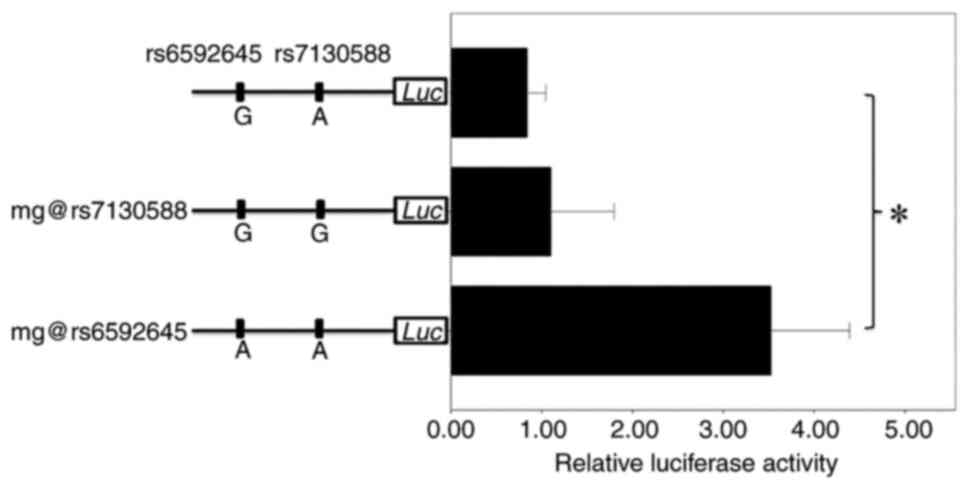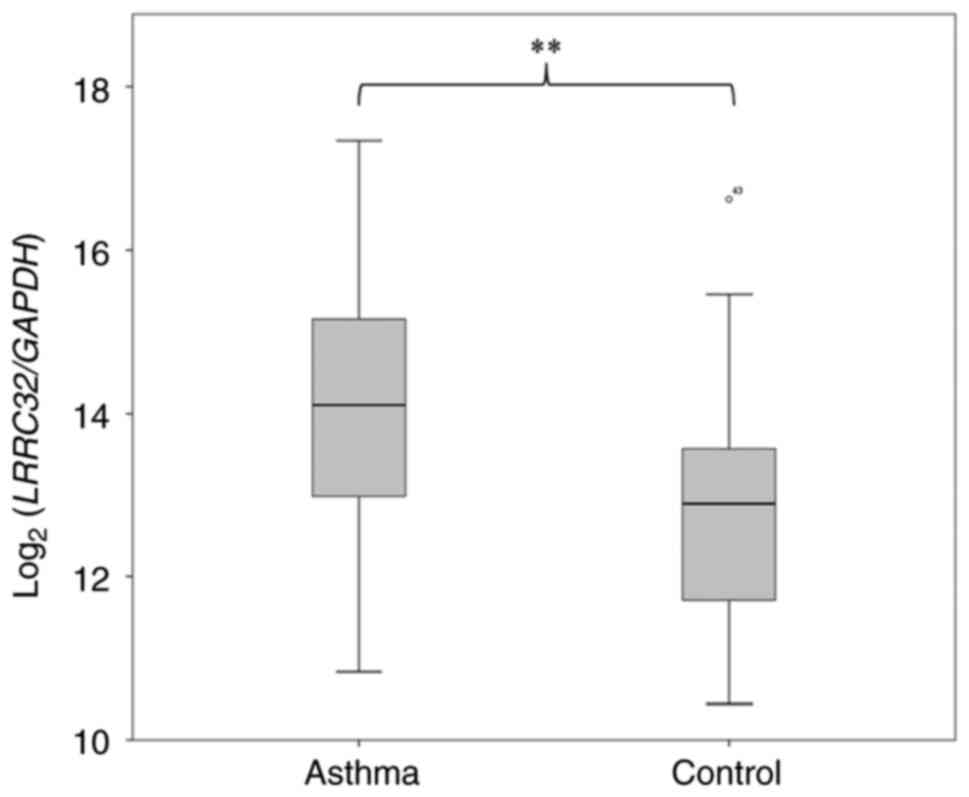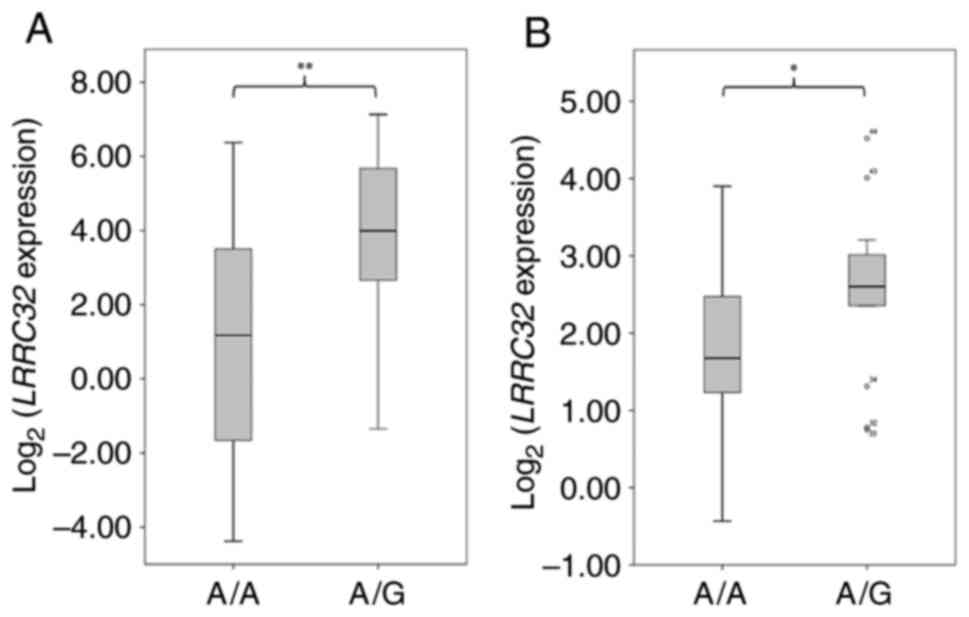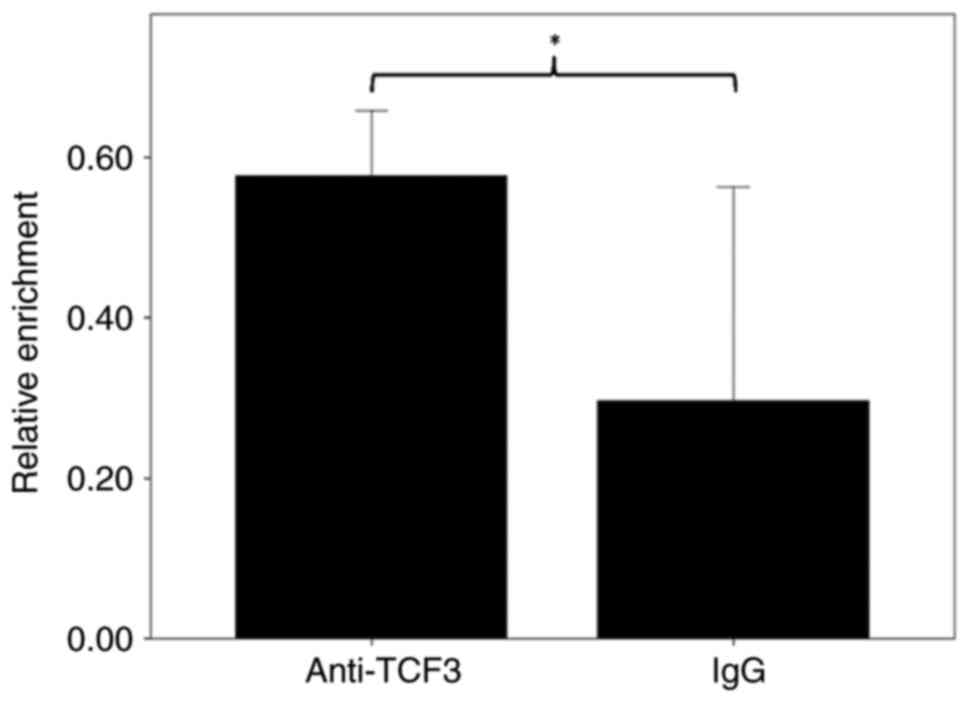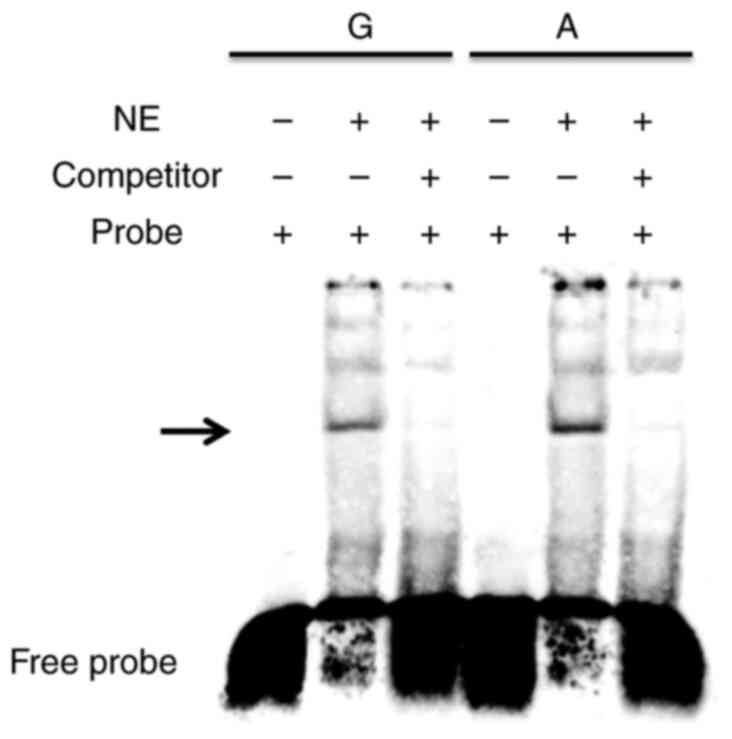|
1
|
Martinez FD and Vercelli D: Asthma.
Lancet. 382:1360–1372. 2013.PubMed/NCBI View Article : Google Scholar
|
|
2
|
Ferreira MA, Matheson MC, Duffy DL, Marks
G, Hui J, Souëf PL, Danoy P, Baltic S, Nyholt DR, Jenkins M, et al:
Identification of IL6R and chromosome 11q13.5 as risk loci for
asthma. Lancet. 378:1006–1014. 2011.PubMed/NCBI View Article : Google Scholar
|
|
3
|
Ferreira MAR, Mathur R, Vonk JM, Szwajda
A, Brumpton B, Granell R, Brew BK, Ullemar V, Lu Y, Jiang Y, et al:
Genetic architectures of childhood- and adult-onset asthma are
partly distinct. Am J Hum Genet. 104:665–684. 2019.PubMed/NCBI View Article : Google Scholar
|
|
4
|
Donertas HM, Fabian DK, Valenzuela MF,
Partridge L and Thornton JM: Common genetic associations between
age-related diseases. Nat Aging. 1:400–412. 2021.PubMed/NCBI View Article : Google Scholar
|
|
5
|
Demenais F, Margaritte-Jeannin P, Barnes
KC, Cookson WOC, Altmüller J, Ang W, Barr RG, Beaty TH, Becker AB,
Beilby J, et al: Multiancestry association study identifies new
asthma risk loci that colocalize with immune-cell enhancer marks.
Nat Genet. 50:42–53. 2018.PubMed/NCBI View Article : Google Scholar
|
|
6
|
Valette K, Li Z, Bon-Baret V, Chignon A,
Bérubé JC, Eslami A, Lamothe J, Gaudreault N, Joubert P, Obeidat M,
et al: Prioritization of candidate causal genes for asthma in
susceptibility loci derived from UK Biobank. Commun Biol.
4(700)2021.PubMed/NCBI View Article : Google Scholar
|
|
7
|
The 1000 Genomes Project Consortium. Auton
A, Brooks LD, Durbin RM, Garrison EP, Kang HM, Korbel JO, Marchini
JL, McCarthy S, McVean GA and Abecasis GR: A global reference for
human genetic variation. Nature. 526:68–74. 2015.PubMed/NCBI View Article : Google Scholar
|
|
8
|
Binia A and Kabesch M: Respiratory
medicine-genetic base for allergy and asthma. Swiss Med Wkly.
142(w13612)2012.PubMed/NCBI View Article : Google Scholar
|
|
9
|
Meyers DA, Bleecker ER, Holloway JW and
Holgate ST: Asthma genetics and personalised medicine. Lancet
Respir Med. 2:405–415. 2014.PubMed/NCBI View Article : Google Scholar
|
|
10
|
Kim KW and Ober C: Lessons learned from
GWAS of asthma. Allergy Asthma Immunol Res. 11:170–187.
2019.PubMed/NCBI View Article : Google Scholar
|
|
11
|
Willis-Owen SAG, Cookson WOC and Moffatt
MF: The genetics and genomics of asthma. Annu Rev Genomics Hum
Genet. 19:223–246. 2018.PubMed/NCBI View Article : Google Scholar
|
|
12
|
Vicente CT, Revez JA and Ferreira MAR:
Lessons from ten years of genome-wide association studies of
asthma. Clin Transl Immunology. 6(e165)2017.PubMed/NCBI View Article : Google Scholar
|
|
13
|
Ortiz RA and Barnes KC: Genetics of
allergic diseases. Immunol Allergy Clin North Am. 35:19–44.
2015.PubMed/NCBI View Article : Google Scholar
|
|
14
|
Li X, Ampleford EJ, Howard TD, Moore WC,
Li H, Busse WW, Castro M, Erzurum SC, Fitzpatrick AM, Gasto B, et
al: The C11orf30-LRRC32 region is associated with total serum IgE
levels in asthmatic patients. J Allergy Clin Immunol. 129:575–578,
578 e571-579. 2012.PubMed/NCBI View Article : Google Scholar
|
|
15
|
Livak KJ and Schmittgen TD: Analysis of
relative gene expression data using real-time quantitative PCR and
the 2(-Delta Delta C(T)) method. Methods. 25:402–408.
2001.PubMed/NCBI View Article : Google Scholar
|
|
16
|
Global Initiative for Asthma: Global
Strategy for Asthma Management and Prevention (2018 update). 2018
(https://ginasthma.org/wp-content/uploads/2019/01/2018-GINA.pdf).
|
|
17
|
Green MR and Sambrook J: Constructing a
standard curve for real-time polymerase chain reaction (PCR)
experiments. Cold Spring Harb Protoc. 2018:836–842. 2018.PubMed/NCBI View Article : Google Scholar
|
|
18
|
Pickrell JK, Marioni JC, Pai AA, Degner
JF, Engelhardt BE, Nkadori E, Veyrieras JB, Stephens M, Gilad Y and
Pritchard JK: Understanding mechanisms underlying human gene
expression variation with RNA sequencing. Nature. 464:768–772.
2010.PubMed/NCBI View Article : Google Scholar
|
|
19
|
Jadhav B, Monajemi R, Gagalova KK, Ho D,
Draisma HHM, van de Wiel MA, Franke L, Heijmans BT, van Meurs J,
Jansen R, et al: RNA-Seq in 296 phased trios provides a
high-resolution map of genomic imprinting. BMC Biol.
17(50)2019.PubMed/NCBI View Article : Google Scholar
|
|
20
|
Edwards SL, Beesley J, French JD and
Dunning AM: Beyond GWASs: Illuminating the dark road from
association to function. Am J Hum Genet. 93:779–797.
2013.PubMed/NCBI View Article : Google Scholar
|
|
21
|
Spitz F and Furlong EE: Transcription
factors: From enhancer binding to developmental control. Nat Rev
Genet. 13:613–626. 2012.PubMed/NCBI View Article : Google Scholar
|
|
22
|
Barrett JC, Hansoul S, Nicolae DL, Cho JH,
Duerr RH, Rioux JD, Brant SR, Silverberg MS, Taylor KD, Barmada MM,
et al: Genome-wide association defines more than 30 distinct
susceptibility loci for Crohn's disease. Nat Genet. 40:955–962.
2008.PubMed/NCBI View
Article : Google Scholar
|
|
23
|
Esparza-Gordillo J, Weidinger S,
Folster-Holst R, Bauerfeind A, Ruschendorf F, Patone G, Rohde K,
Marenholz I, Schulz F, Kerscher T, et al: A common variant on
chromosome 11q13 is associated with atopic dermatitis. Nat Genet.
41:596–601. 2009.PubMed/NCBI View
Article : Google Scholar
|
|
24
|
Marenholz I, Bauerfeind A,
Esparza-Gordillo J, Kerscher T, Granell R, Nickel R, Lau S,
Henderson J and Lee YA: The eczema risk variant on chromosome 11q13
(rs7927894) in the population-based ALSPAC cohort: A novel
susceptibility factor for asthma and hay fever. Hum Mol Genet.
20:2443–2449. 2011.PubMed/NCBI View Article : Google Scholar
|
|
25
|
Calo E and Wysocka J: Modification of
enhancer chromatin: What, how, and why? Mol Cell. 49:825–837.
2013.PubMed/NCBI View Article : Google Scholar
|
|
26
|
Li YK, Zhang XX, Yang Y, Gao J, Shi Q, Liu
SD, Fu WP and Sun C: Convergent evidence supports TH2LCRR as a
novel asthma susceptibility gene. Am J Respir Cell Mol Biol.
66:283–292. 2022.PubMed/NCBI View Article : Google Scholar
|
|
27
|
Zhu Y, Mao D, Gao W, Han G and Hu H:
Analysis of lncRNA expression in patients with eosinophilic and
neutrophilic asthma focusing on LNC_000127. Front Genet.
10(141)2019.PubMed/NCBI View Article : Google Scholar
|
|
28
|
Altman MC, Whalen E, Togias A, O'Connor
GT, Bacharier LB, Bloomberg GR, Kattan M, Wood RA, Presnell S,
LeBeau P, et al: Allergen-induced activation of natural killer
cells represents an early-life immune response in the development
of allergic asthma. J Allergy Clin Immunol. 142:1856–1866.
2018.PubMed/NCBI View Article : Google Scholar
|
|
29
|
Murray LM, Thillaiyampalam G, Xi Y,
Cristino AS and Upham JW: Whole transcriptome analysis of high and
low IFN-α producers reveals differential response patterns
following rhinovirus stimulation. Clin Transl Immunology.
10(e1356)2021.PubMed/NCBI View Article : Google Scholar
|
|
30
|
Sie L, Loong S and Tan EK: Utility of
lymphoblastoid cell lines. J Neurosci Res. 87:1953–1959.
2009.PubMed/NCBI View Article : Google Scholar
|
|
31
|
Nasrallah R, Imianowski CJ,
Bossini-Castillo L, Grant FM, Dogan M, Placek L, Kozhaya L, Kuo P,
Sadiyah F, Whiteside SK, et al: A distal enhancer at risk locus
11q13.5 promotes suppression of colitis by Treg cells. Nature.
583:447–452. 2020.PubMed/NCBI View Article : Google Scholar
|
|
32
|
Morikawa M, Derynck R and Miyazono K:
TGF-β and the TGF-β family: Context-dependent roles in cell and
tissue physiology. Cold Spring Harb Perspect Biol.
8(a021873)2016.PubMed/NCBI View Article : Google Scholar
|
|
33
|
Al-Alawi M, Hassan T and Chotirmall SH:
Transforming growth factor β and severe asthma: A perfect storm.
Respir Med. 108:1409–1423. 2014.PubMed/NCBI View Article : Google Scholar
|
|
34
|
Wang R, Zhu J, Dong X, Shi M, Lu C and
Springer TA: GARP regulates the bioavailability and activation of
TGFβ. Mol Biol Cell. 23:1129–1139. 2012.PubMed/NCBI View Article : Google Scholar
|
|
35
|
Tran DQ, Andersson J, Wang R, Ramsey H,
Unutmaz D and Shevach EM: GARP (LRRC32) is essential for the
surface expression of latent TGF-beta on platelets and activated
FOXP3+ regulatory T cells. Proc Natl Acad Sci USA. 106:13445–13450.
2009.PubMed/NCBI View Article : Google Scholar
|
|
36
|
Metelli A, Wu BX, Fugle CW, Rachidi S, Sun
S, Zhang Y, Wu J, Tomlinson S, Howe PH, Yang Y, et al: Surface
expression of TGFbeta docking receptor GARP promotes oncogenesis
and immune tolerance in breast cancer. Cancer Res. 76:7106–7117.
2016.PubMed/NCBI View Article : Google Scholar
|
|
37
|
Probst-Kepper M, Geffers R, Kroger A,
Viegas N, Erck C, Hecht HJ, Lünsdorf H, Roubin R,
Moharregh-Khiabani D, Wagner K, et al: GARP: A key receptor
controlling FOXP3 in human regulatory T cells. J Cell Mol Med.
13:3343–3357. 2009.PubMed/NCBI View Article : Google Scholar
|
|
38
|
Metelli A, Salem M, Wallace CH, Wu BX, Li
A, Li X and Li Z: Immunoregulatory functions and the therapeutic
implications of GARP-TGF-β in inflammation and cancer. J Hematol
Oncol. 11(24)2018.PubMed/NCBI View Article : Google Scholar
|
|
39
|
Weissler KA and Frischmeyer-Guerrerio PA:
Genetic evidence for the role of transforming growth factor-β in
atopic phenotypes. Curr Opin Immunol. 60:54–62. 2019.PubMed/NCBI View Article : Google Scholar
|
|
40
|
Li X, Hastie AT, Hawkins GA, Moore WC,
Ampleford EJ, Milosevic J, Li H, Busse W, Erzurum SC, Kaminski N,
et al: eQTL of bronchial epithelial cells and bronchial alveolar
lavage deciphers GWAS-identified asthma genes. Allergy.
70:1309–1318. 2015.PubMed/NCBI View Article : Google Scholar
|
|
41
|
Zhu Z, Lee PH, Chaffin MD, Chung W, Loh
PR, Lu Q, Christiani DC and Liang L: A genome-wide cross-trait
analysis from UK Biobank highlights the shared genetic architecture
of asthma and allergic diseases. Nat Genet. 50:857–864.
2018.PubMed/NCBI View Article : Google Scholar
|
|
42
|
Weidinger S, Willis-Owen SA, Kamatani Y,
Baurecht H, Morar N, Liang L, Edser P, Street T, Rodriguez E,
O'Regan GM, et al: A genome-wide association study of atopic
dermatitis identifies loci with overlapping effects on asthma and
psoriasis. Hum Mol Genet. 22:4841–4856. 2013.PubMed/NCBI View Article : Google Scholar
|
|
43
|
Chen MH, Raffield LM, Mousas A, Sakaue S,
Huffman JE, Moscati A, Trivedi B, Jiang T, Akbari P, Vuckovic D, et
al: Trans-ethnic and ancestry-specific blood-cell genetics in
746,667 individuals from 5 global populations. Cell. 182:1198–1213
e1114. 2020.PubMed/NCBI View Article : Google Scholar
|
|
44
|
Vuckovic D, Bao EL, Akbari P, Lareau CA,
Mousas A, Jiang T, Chen MH, Raffield LM, Tardaguila M, Huffman JE,
et al: The polygenic and monogenic basis of blood traits and
diseases. Cell. 182:1214–1231 e1211. 2020.PubMed/NCBI View Article : Google Scholar
|
|
45
|
Astle WJ, Elding H, Jiang T, Allen D,
Ruklisa D, Mann AL, Mead D, Bouman H, Riveros-Mckay F, Kostadima
MA, et al: The allelic landscape of human blood cell trait
variation and links to common complex disease. Cell. 167:1415–1429
e1419. 2016.PubMed/NCBI View Article : Google Scholar
|
|
46
|
Liu JZ, van Sommeren S, Huang H, Ng SC,
Alberts R, Takahashi A, Ripke S, Lee JC, Jostins L, Shah T, et al:
Association analyses identify 38 susceptibility loci for
inflammatory bowel disease and highlight shared genetic risk across
populations. Nat Genet. 47:979–986. 2015.PubMed/NCBI View Article : Google Scholar
|
|
47
|
Jostins L, Ripke S, Weersma RK, Duerr RH,
McGovern DP, Hui KY, Lee JC, Schumm LP, Sharma Y, Anderson CA, et
al: Host-microbe interactions have shaped the genetic architecture
of inflammatory bowel disease. Nature. 491:119–124. 2012.PubMed/NCBI View Article : Google Scholar
|
|
48
|
Peyrot WJ and Price AL: Identifying loci
with different allele frequencies among cases of eight psychiatric
disorders using CC-GWAS. Nat Genet. 53:445–454. 2021.PubMed/NCBI View Article : Google Scholar
|
|
49
|
de Lange KM, Moutsianas L, Lee JC, Lamb
CA, Luo Y, Kennedy NA, Jostins L, Rice DL, Gutierrez-Achury J, Ji
SG, et al: Genome-wide association study implicates immune
activation of multiple integrin genes in inflammatory bowel
disease. Nat Genet. 49:256–261. 2017.PubMed/NCBI View Article : Google Scholar
|
|
50
|
Sliz E, Huilaja L, Pasanen A, Laisk T,
Reimann E and Mägi R: FinnGen; Estonian Biobank Research Team.
Hannula-Jouppi K, Peltonen S, et al: Uniting biobank resources
reveals novel genetic pathways modulating susceptibility for atopic
dermatitis. J Allergy Clin Immunol. 149:1105–1112 e1109.
2022.PubMed/NCBI View Article : Google Scholar
|
|
51
|
Li Y, Chen J, Rui X, Li N, Jiang F and
Shen J: The association between sixteen genome-wide association
studies-related allergic diseases loci and childhood allergic
rhinitis in a Chinese Han population. Cytokine. 111:162–170.
2018.PubMed/NCBI View Article : Google Scholar
|















